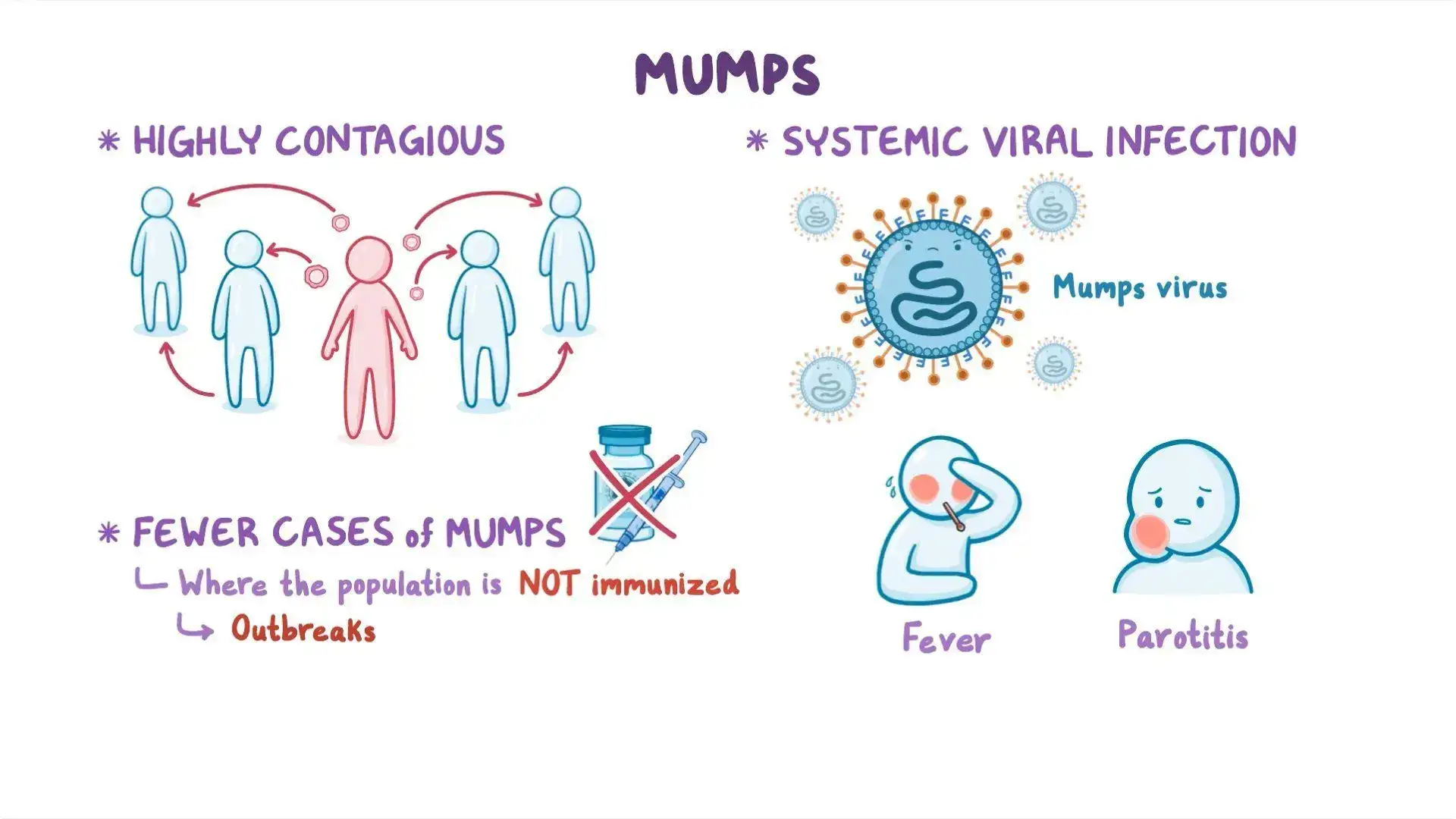

Kjo është një sëmundje e shkaktuar nga një virus nga familja paramyxovirus. Sëmundja quhet edhe "shytat" për shkak të një prej simptomave të saj karakteristike: një rritje e dukshme në gjëndrën e pështymës ose gjëndrat parotide, poshtë veshit.
Epiparotiti transmetohet nga pikat e ajrit: domethënë kur flasim, kolliteni, teshtini me grimca pështymë. Ekziston gjithashtu mundësia e transmetimit përmes kontaktit dhe kontaktit me shtëpi nëpërmjet duarve të kontaminuara, enëve të palara ose objekteve të tjera të kontaminuara.
Sa kohë pas infeksionit do të shfaqen simptomat e para?
Periudha e inkubacionit është më shpesh 16-18 ditë, por mund të jetë nga 12 deri në 25 ditë.
Simptomat e para më të zakonshme janë simptomat jo specifike të ftohjes së zakonshme, të tilla si:
Disa njerëz kanë shytat mjaft lehtë, simptomat janë të lehta, shpesh pacienti as nuk e di se me çfarë është i sëmurë. Megjithatë, kjo nuk ndodh gjithmonë. Tek të rriturit, sëmundja është më e rëndë se tek fëmijët.
Sa e rrezikshme është sëmundja? Çfarë komplikimesh janë të mundshme?
Sëmundja mund të jetë shumë e rrezikshme. Para prezantimit të vaksinimit, shytat ishte një nga shkaqet më të zakonshme të shurdhimit dhe meningjitit (inflamacion të meningjeve).
Komplikimet e mundshme të parotitit përfshijnë:
Në Ukrainë, ekziston një vaksinë gjithëpërfshirëse KPK (Priorix ose MM-RII»/MM-RII), e cila gjithashtu mbron nga fruthi dhe rubeola. Duhen dy doza të vaksinës për t'u mbrojtur nga këto tre infeksione. Në Ukrainë, vaksinimi kundër fruthit, shytave dhe rubeolës është përfshirë në Kalendarin Kombëtar të Vaksinimit. Sipas tij, fëmijët me mjete buxhetore e bëjnë këtë vaksinim në 12 muaj dhe në 6 vjet. Nëse fëmija për arsye të caktuara ka humbur një nga vaksinat ose nuk ka marrë asnjë, vaksinojeni atë sipas kalendarit në rast të shkeljes së orarit të vaksinimit . Nëse fëmija ka marrë dozën e parë të vaksinës PDA në një moshë më të madhe se 12 muaj, doza e dytë administrohet sipas kalendarit - në moshën 6 vjeç (me një interval minimal prej 1 muaji nga doza e mëparshme). Nëse ka ndodhur që vaksinimi kundër fruthit, shytave dhe rubeolës të fillojë pas 6 vitesh, mund të merren dy doza të vaksinës me një interval minimal prej 1 muaji.
Të rriturit, në mungesë të kundërindikacioneve të renditura në udhëzimet për përdorimin e vaksinës, vaksinohen pa kufizime moshe, nëse nuk kanë vuajtur nga infeksionet e specifikuara dhe/ose nuk kanë konfirmim për dhënien e dy dozave të vaksinës së treguar. në dokumentacionin mjekësor, ose kanë rezultate negative të testeve laboratorike për praninë e antitrupave specifikë IgG. Aktualisht, për shkak të numrit të kufizuar të vaksinave për vaksinimet rutinë të fëmijëve, të rriturit mund të vaksinohen kundër fruthit, shytave dhe rubeolës vetëm me shpenzimet e tyre. Vaksina mund të blihet në rrjetin e farmacive dhe procedura e vaksinimit mund të kryhet në objektin mjekësor ku keni nënshkruar deklaratën (ose në objektin mjekësor ku jeni duke u trajtuar aktualisht, nëse jeni PZHBV). Ju gjithashtu mund të regjistroheni për vaksinim në një institucion mjekësor privat. Intervali minimal ndërmjet dy dozave të vaksinës PDA është 1 muaj.
Për të siguruar vaksinimin kundër fruthit, shytave dhe rubeolës, vaksinat Priorix (prodhuar nga Glaxosmithkline Biologicals SA, Belgjikë) dhe MM -RII (prodhuar nga Merck & Co., Inc., USA) përdoren në Ukrainë).
Nuk ka trajtim specifik, vetëm trajtim simptomatik (regjim shtrati dhe pije, ulja e temperaturës së trupit).
